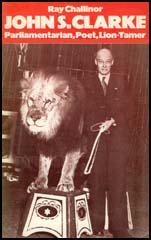Labour MPs: the decline of the lion tamers
Post the EU Referendum, many Labour MPs who did not support Jeremy Corbyn for Labour leader last summer have decided, unsurprisingly, that they still don’t back him. They now want to replace him. Pontypridd MP Owen Smith has emerged as the man (in a suit) to challenge Corbyn. I suspect Mr Smith sums up a good deal of the contradictions and changes in Welsh Labour and labour movement politics over the last 40 years or so, but that is for another post
Corbyn won the Labour leader election in September 2015 by more than a country mile because his opponents were or were thought to be politically dull.
Andy Burnham has done great work around Hillsborough but he is arguably not a man to ‘set the world on fire’ otherwise. Yvette Cooper can be a very effective performer in the Commons, but again is hardly an celebrated orator outside. The best that can be said for Liz Kendall is that she made the case for a New Labour politics 20 years on. But as her small share of the vote underlined, the world has moved on, New Labour is not ‘new’ anymore, although one suspects that point rather eludes some Labour MPs.
It would indeed be good if the next Labour leader, whenever that becomes an eventuality, were not a man in a suit but a woman. Margaret Beckett was leader briefly after the death of John Smith but that aside Labour has not had a female leader. That does not reflect modern society.
However the Labour leadership is not just about gender but also politics- as is the Tory leadership.
The problem the Parliamentary Labour Party has, and it is a big one, is that numbers of its MPs no longer fully represent the backgrounds of working men and women- working class voters- it hopes to get the votes of.
The process was underway some time before Blair appeared but New Labour made a fetish of promoting the suited representative with no great aspirations to change a world they had usually done quite well in already.
Yet Labour MPs were far from always like this.
Below is a brief summary of an MP who did wear a suit but whose CV is rather more interesting and varied than at least some of the current crop of Labour MPs.
I’ve also been looking at the background of the 29 Labour MPs who were elected in 1906 on an LRC platform. They were all men (at least progress has been made in this respect) and were split 50-50 between moustache and beard wearers. However my research was about rather more relevant matters and I’ll also post further on that
John S Clarke (1885-1959) was Labour MP for Glasgow Maryhill from 1929 until 1931.
He learned how to be a lion tamer in circuses in his teenage years and continued to do this throughout his life. He became a sailor and in that capacity ran guns to the 1905 Russian Revolution.
He opposed World War One, writing anti-war poems, but rather than apply to become a conscientious objector he successfully went on the run from the authorities.
After the War he was a non-voting delegate at the Second Congress of the Comintern in 1920. While in Russia he famously cured Lenin’s dog of an illness.
In the early 1920s Clarke became a member of the Independent Labour Party though he left when the ILP disaffiliated from Labour in 1932.
After his period as a Labour MP, Clarke, the lion tamer and poet, pursued an interest in Renaissance Art sitting on a range of public bodies that protected it in Scotland.
It seems quite unlikely that a man with such a varied background would make it through a Labour Party candidate selection process today, let alone be elected as a Labour MP.
As the current furore around Jeremy Corbyn’s leadership by MPs whose extra-Parliamentary CV is in most cases remarkably thin underlines, the Labour Party and the labour movement is much the poorer for not having people like John S Clarke in its ranks.
That is a pity because as a trade unionist who frequently represents people in difficult times, I know more than most how much a Labour Government, even one that makes only small changes, means to the circumstances of many.
Of course wider change would be desirable and is quite possibly achievable but that doesn’t detract from the point above.



Leave a comment